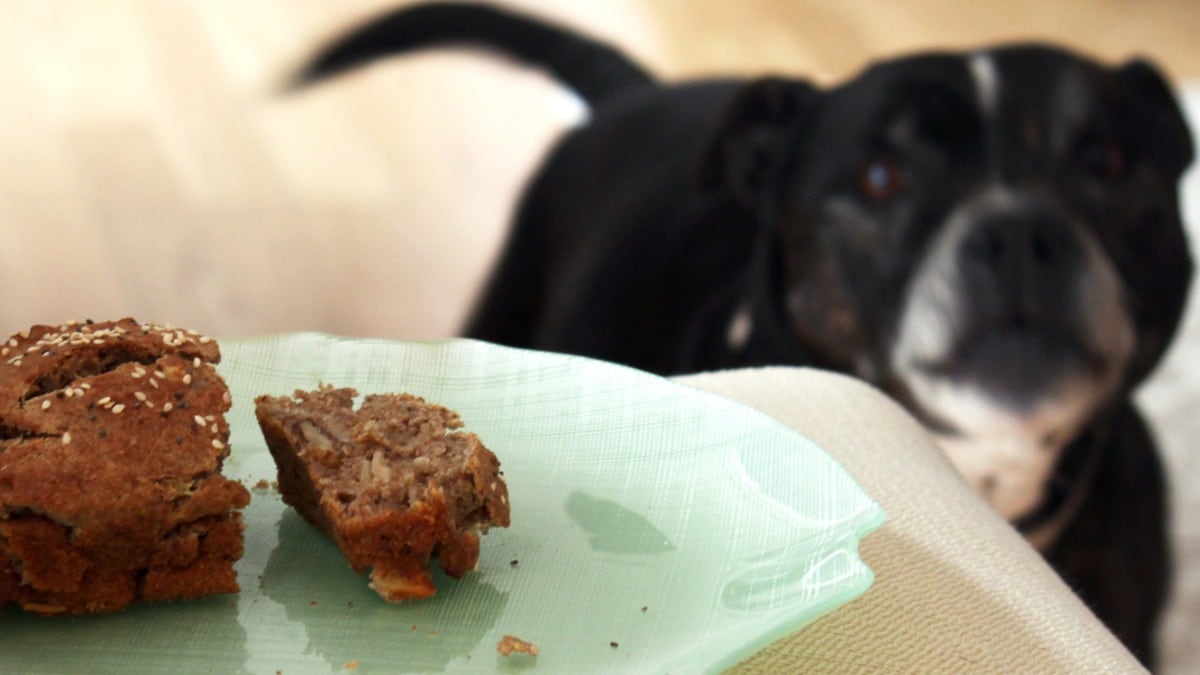Wholemeal bread, also known as whole wheat bread, is a type of bread made from whole grains that can be a source of fiber, nutrients, and energy for humans.
When it comes to dogs, offering wholemeal bread in small amounts on occasion is generally safe, but there are a few factors to consider.
Wholemeal bread can provide some dietary benefits to dogs due to its fiber content, which can help promote regular bowel movements and digestive health. Additionally, whole grains in moderation can offer a source of energy and essential nutrients.
However, it’s important to ensure that the wholemeal bread is given in moderation and as a treat rather than a staple in a dog’s diet.
What Happens If a Dog Eats Whole Wheat Bread?
If a dog eats a small amount of whole wheat bread, it’s generally not a cause for immediate concern. Whole wheat bread, like other types of bread, is not inherently toxic to dogs, and small quantities are usually not harmful. However, there are a few things to consider:
- Digestive Sensitivity: Dogs have different digestive systems than humans, and some may be more sensitive to certain foods. Whole wheat bread contains gluten, and some dogs could potentially have sensitivities or allergies to gluten. Introduce it in small amounts to gauge your dog’s reaction.
- Portion Size: Whole wheat bread should only be given as an occasional treat and in moderation. Bread, including whole wheat bread, is not a necessary component of a dog’s diet and should not replace their balanced dog food.
- Avoid Additives: Plain, unseasoned whole wheat bread is the safest option for dogs. Avoid breads with added ingredients like raisins, nuts, seeds, or artificial sweeteners, as these can be harmful to dogs.
- Monitor for Allergic Reactions: After your dog consumes whole wheat bread, observe them for any signs of allergies or sensitivities. Common symptoms include vomiting, diarrhea, itching, or excessive licking.
- Weight Management: Whole wheat bread, like any other type of bread, contains calories. Excessive consumption of bread can contribute to weight gain in dogs. If your dog is overweight or prone to weight gain, it’s best to limit bread intake.
- Consult Your Veterinarian: If you’re unsure whether whole wheat bread is suitable for your dog or if your dog has any pre-existing health conditions, it’s a good idea to consult your veterinarian before introducing it into their diet.
In summary, a small piece of plain, unseasoned whole wheat bread as an occasional treat is unlikely to cause harm to most dogs. However, it’s important to prioritize a balanced and appropriate diet for your dog’s overall health. If you have any concerns or doubts about offering whole wheat bread to your dog, consulting your veterinarian is always a good idea.
Can I Give Brown Bread to My Dog?
Yes, you can give brown bread to your dog. Brown bread is safe for dogs to eat in moderation. However, some dogs may be allergic to wheat or other ingredients in brown bread.
If you notice your dog has any adverse reaction after eating brown bread, such as vomiting or diarrhea, stop feeding it to them and consult your veterinarian.
Is Multigrain Bread Ok for Dogs?
Yes, multigrain bread is perfectly safe for dogs to eat. In fact, it can be a healthy and nutritious treat for them! Just make sure that the bread doesn’t contain any raisins or grapes, as these can be toxic to dogs.
Other than that, feel free to let your pup enjoy a slice of delicious multigrain bread!

Credit: be.chewy.com
Can Dogs Eat Multigrain Bread?
The answer is yes, as long as the bread is multigrain. Multigrain bread is made with whole grains, which are packed with nutrients that are beneficial for dogs. Whole grains contain fiber, vitamins, and minerals that can help keep your dog healthy.
They also provide complex carbohydrates, which can give your dog sustained energy throughout the day.
So if you want to give your four-legged friend a delicious and nutritious treat, reach for some multigrain bread next time you’re at the store!
Can Dogs Eat Peanut Butter?
Peanut butter is safe for dogs to eat in small quantities. However, there are a few things you should keep in mind when feeding your dog this popular snack.
First, choose a peanut butter that does not contain xylitol. This sweetener is toxic to dogs and can cause serious health problems.
Second, opt for a natural peanut butter with no added sugar or salt. These ingredients are not good for dogs and can cause gastrointestinal issues.
Finally, only give your dog a small amount of peanut butter as a treat – too much can lead to weight gain. So go ahead and share the love with your four-legged friend – just be sure to do so safely!
Can Dogs Eat Cheese?
Yes, dogs can eat cheese. In fact, cheese is a great source of protein and calcium for dogs. However, some dogs may be allergic to cheese or have trouble digesting it. If you’re unsure about feeding your dog cheese, ask your vet for advice.
Conclusion
Wholemeal bread is often given to dogs as a treat, but some people are unsure if it is safe for them to eat. The answer is yes, wholemeal bread is perfectly safe for dogs to eat in moderation. Wholemeal bread is a good source of fiber and can help to keep your dog’s digestive system healthy.